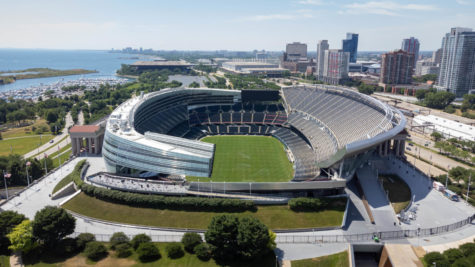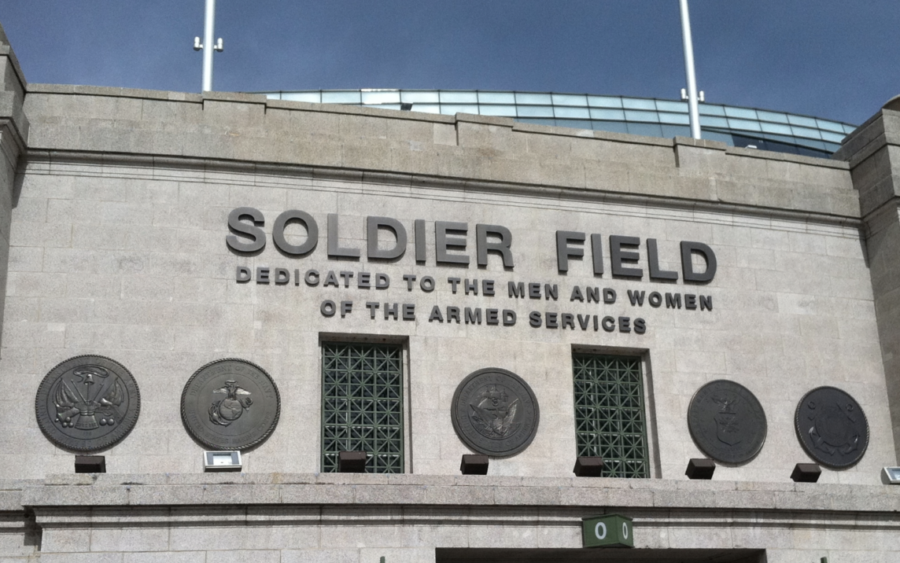Opinion | Chicago Bears’ move to suburbs ignores community wishes
April 20, 2023
As I approach Soldier Field on a frigid winter day, I feel a lovely sense of deja vu. I’ve been coming to Bears games since I was seven years old, just as my parents and even grandparents did. I pass by the hulking, neo-Greek pillars—steadfast in their ageless, imposing beauty. I take notice of food and drink vendors, bellowing in booming baritones, commanding customers to purchase their goods. Most striking, though, is the bustling swarm of humanity—all together in support of a common purpose. If it sounds frivolous, that’s because it is. But in these days of societal division, frivolity is quite possibly our greatest unifier. This silly passion connects all of Chicagoland, and, ultimately, that’s important. Every Sunday, thousands upon thousands of rowdy Bears fans amalgamate at the Mecca of NFL football.
The atmosphere at Soldier Field is decidedly blue-collar, true to the roots of the team and the city it inhabits. The brand of English spoken starkly contrasts to how people talk in the suburbs— it’s heavily accented and brusque; who has time for pleasantries? Impassioned (intoxicated) supporters rain down barbs at opposing players with the zeal and conviction of a southern preacher. In other words, it’s perfect. The hostility hardly ever boils over into real conflict, and it provides the Bears with one of the NFL’s best home-field advantages.
However, when I go to Bears games now, there is a threatening black cloud over Chicago’s idyllic lakefront. An insidious storm is gathering, one of new money and shady dealings; one that opposes everything my team and its city stand for.
On Feb. 15, the Chicago Bears purchased the grounds of the former Arlington International Racecourse. The property is located in Arlington Heights, Ill., a suburb located about an hour outside of Chicago. The sale is a clear indication that, if nothing changes in regards to their current place of play, the Bears intend to relocate to a shiny, new suburban home. The team’s official statement called the deal “A new and exciting chapter for the Bears, our fans, the Chicagoland community, and the State of Illinois.” Rich.
 If it isn’t already plain to see, this potential move has nothing to do with football and certainly nothing to do with fans. It’s a corporate money grab, just the next in an increasingly costly line of instances in which cash flow is prioritized over product in sport. In fact, if the team would just admit that, I could at least see their reasoning.
If it isn’t already plain to see, this potential move has nothing to do with football and certainly nothing to do with fans. It’s a corporate money grab, just the next in an increasingly costly line of instances in which cash flow is prioritized over product in sport. In fact, if the team would just admit that, I could at least see their reasoning.
It is important to admit that Soldier Field is the smallest stadium in the NFL in terms of capacity. Its size, coupled with its weather and lack of a dome, makes the prospect of hosting a Super Bowl impossible. What people fail to realize, though, is that cold-weather teams with new stadiums generally only get to host the title game once before it migrates back to cities with more temperate climates. Other than that one—mostly invalid—argument, all other points of contention revolve around the prospect of hosting concerts and NCAA basketball games. To that I respond, who cares? It’s laughable that a team who finished last in the entire NFL last year appears to be more concerned with designing a suburban entertainment hub than winning football games.
What proponents of a new stadium seem not to understand is that they are directly opposing their fans. In a survey conducted by NBC Chicago in association with WBEZ, Telemundo Chicago and the Chicago Sun-Times, the response was resounding. A majority of Chicagoans want the team to stay at Soldier Field, while only 23 percent of respondents agree with the move. The first thing I feel after hearing statistics like that is anger at the entitlement of the franchise. When you’ve built your team—your brand— off the fandom and financial contributions of Chicagoans, you’d better listen to what they have to say. A team cannot in good conscience call itself the “Chicago” Bears when it doesn’t respect the views of the city and its citizens.
One factor that isn’t touched on enough in this debate is character. What type of atmosphere do we want at Bears games? I know that I don’t want to attend a stadium that feels more like an amusement park than a football field. Anecdotally, when one looks at the NFL’s consensus “best” fanbases, nearly all of them hail from cold-weather cities with no domed stadium. In addition to the Bears, some of the other fan bases that are known for their toughness and dedication are the Eagles, Chiefs, Bills, Steelers, Browns, Bengals and yes, the Packers. Meanwhile, teams such as the Rams, Chargers and Cardinals are lampooned on social media for their fans’ lack of commitment. Like the environment in which their teams play, they are fair weather. It isn’t uncommon in places like Los Angeles’ SoFi Stadium for opposing fans to nearly outnumber Rams and Chargers supporters. Hard conditions such as “Windy City Weather” separate real fans from plastic ones.
Lastly, in a league so corrupted by money-grubbing gluttony, Soldier Field is a refreshing exception. Not only is it owned and controlled solely by the City of Chicago’s Department of Parks and Recreation—the only such stadium in the league with this situation— it also serves as a monument to our country’s armed forces. No shallow sponsorships taint this everlasting sentinel of competition.
It was the Chicago writer Nelson Algren who once said of the city: “You may well find lovelier lovelies. But never a lovely so real.” That’s what makes Soldier Field special. It’s not the biggest or the flashiest, but I’ll be darned if it isn’t real.










Bill Fry • Apr 21, 2023 at 11:05 am
You go, Nathan!